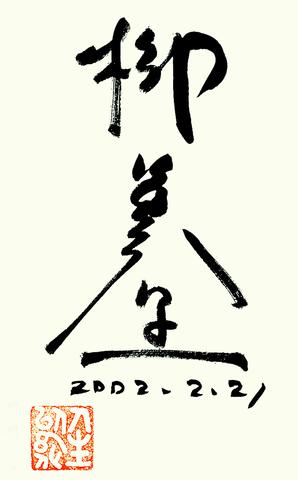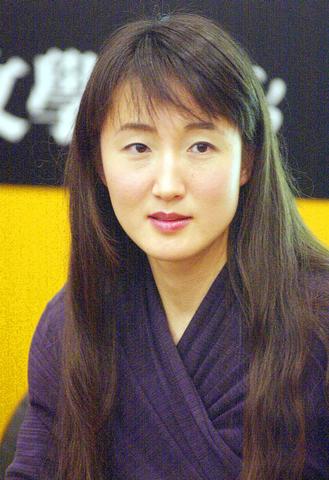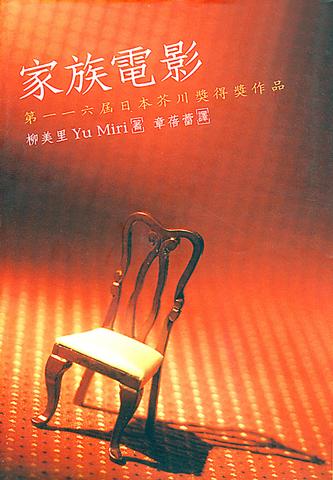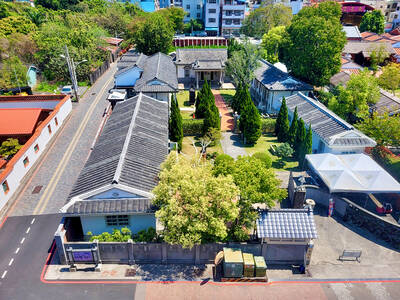During a three-day visit to Taiwan, Yu Miri, a Japanese-Korean writer, attracted numerous fans at the Taipei International Book Exhibition (TIBE). Her appeal lies not only in the gentle and graceful appearance, but also in the clear-cut yet profound ideas that she had to share.
At the Fnac Literature Cafe, (the Fnac book store was Yu Miri's official host), held at the TIBE venue, more than 200 fans queued each day to get her autograph.

Yu responded warmly to the attention, signing her name with a traditional Chinese brush.

PHOTO: CHIANG YING-YING
"Redemption is something that doesn't exist; a scar can never be completely healed. I don't write for these reasons. I just feel that I would die without creation, without expressing myself," the award-winning writer said, responding to questions about her controversial, highly autobiographical works.
Yu was born in 1968, the eldest daughter of Korean parents, in Yokohama, Japan. She was the product of a broken family. Her parents separated when she was still a child, and more than once she witnessed scenes when wives of her mother's married lovers would come looking for their husbands at her home.

PHOTO COURTESY OF RYE FIELD
As the offspring of Korean parents, her school life in Japan was not easy. Yu wrote that she never spoke to any of her classmates during her high school years and on several occasions, the quite and unsociable teenager attempted suicide. At 18, she became an actress at the Tokyo Kid Brothers theater, and later she founded the Seishun Gogatsu-to theater (Youth in May).
All these unhappy experiences became material for her books, which have received a very high level of recognition in Japan. Family Movie (1997) won her the Akutagawa Literature Prize, Japan's most prestigious literature prize. She was the youngest person ever to have won this prize. Previously, her play Fish Festival had been awarded the Kishida Kunio Drama Prize. Another novel, Fullhouse, won the Izumi Kyoka Prize and Noma Bungei Newcomer Literature Prize.
Yu's writing looks at the cruel world and the darkness within her own heart. Family Movie looks at a dysfunctional family that poses as a picture of happy normality to make a family documentary film.
Fullhouse and Specimen of Family look with a cold eye at the hatred and bizarre behavior of families falling apart. Other works, such as Encyclopedia of My Private Talk has stories that reveal her ideas about sex. There is a story about a daughter's ambiguous ties with her father's mistress. They talk about sizes of breasts and share sexual knowledge and experience with each other.
In Encyclopedia, Yu Miri admits that she is writing about her own father complex and her sexual experience with different men. Also, she writes about her experiences of being sexually harassed. Instead of feeling shocked or hurt, she wrote that she even felt somewhat indulgent and let the harassment continue. "I did not feel any discomfort. To me, those men were just sad, miserable and ridiculous beings," she wrote.
Yu never resorts to sensationalism or exoticism when writing about human feelings or sex, nor has she even romanticize the world of her own misery. Tender and beautiful, Yu never shies away from reality but maintains a sense of alienated distance. Forthrightness and honesty have become her most powerful weapons in staking her claim as a writer.
"The family without some problems does not exist, for there are cracks in all human relationships," she said during a panel discussion with her readers.
Apart from Japan and Korea, Taiwan is the country in which she is most popular. Publisher Rye Field (
Yu's books are also published by French publisher Picquier and US publisher Welcome Rain. Yu has been chosen by Barnes and Noble for inclusion in the Discovery Series of New Great Authors, along with 15 other writers from around the world, which is yet to be published.
Life, the first volume of her most autobiographical series, has become a bestseller in Japan with over 500,000 copies sold. The book looks at her decision to become a single mother after being abandoned by her son's father, a married man, and of her time spent with cancer-stricken ex-lover Higashi Yukata. Higashi spent a period toward the end of his life taking care of the heart-broken, pregnant Yu. And Yu, after giving birth to her son, takes care of the dying Higashi. For Yu, the three people seem to become a family reborn. The birth of her son gives a new light to her writing.
Life has been followed by Soul, about her struggle with Higashi's cancer, and To Live, about her life with her son as a new family. These books are all written in the first person and are intimate accounts of her personal life in the Japanese tradition of the private novel (
But how far can such private novels go? How can these works stay literary and not become a form of voyeurism.
There is difference between reality and my writing, Yu said. I write according to my memory of reality. My memory begins the process of fictionalization from the moment I start writing. So, she said, the "private novels" are all "fiction with a literary nature. ... Their similarity to reality does not necessarily make them true or real," she said.
Recently, Yu took up jogging, and will even race a marathon in Korea. Her grandfathers were both famous marathon runners in Korea, but they suffered political persecution because of their leftist views.
"For me, running is similar to writing," Yu said. "You stand on the ground, but for a few seconds as you run, both feet are off the ground -- it is like flying," she said. "I write about reality, and imagine myself as a bird who doesn't fly, but I continues to flap my wings to enjoy the few seconds off the ground. Literature, for me, is the wind under my wings," she said.
A television miniseries by NHK of Yu Miri's novel "Rouge" will air in Taiwan on PTS (

In the March 9 edition of the Taipei Times a piece by Ninon Godefroy ran with the headine “The quiet, gentle rhythm of Taiwan.” It started with the line “Taiwan is a small, humble place. There is no Eiffel Tower, no pyramids — no singular attraction that draws the world’s attention.” I laughed out loud at that. This was out of no disrespect for the author or the piece, which made some interesting analogies and good points about how both Din Tai Fung’s and Taiwan Semiconductor Manufacturing Co’s (TSMC, 台積電) meticulous attention to detail and quality are not quite up to

Chinese Nationalist Party (KMT) Chairman Eric Chu (朱立倫) hatched a bold plan to charge forward and seize the initiative when he held a protest in front of the Taipei City Prosecutors’ Office. Though risky, because illegal, its success would help tackle at least six problems facing both himself and the KMT. What he did not see coming was Taipei Mayor Chiang Wan-an (將萬安) tripping him up out of the gate. In spite of Chu being the most consequential and successful KMT chairman since the early 2010s — arguably saving the party from financial ruin and restoring its electoral viability —

It is one of the more remarkable facts of Taiwan history that it was never occupied or claimed by any of the numerous kingdoms of southern China — Han or otherwise — that lay just across the water from it. None of their brilliant ministers ever discovered that Taiwan was a “core interest” of the state whose annexation was “inevitable.” As Paul Kua notes in an excellent monograph laying out how the Portuguese gave Taiwan the name “Formosa,” the first Europeans to express an interest in occupying Taiwan were the Spanish. Tonio Andrade in his seminal work, How Taiwan Became Chinese,

Toward the outside edge of Taichung City, in Wufeng District (霧峰去), sits a sprawling collection of single-story buildings with tiled roofs belonging to the Wufeng Lin (霧峰林家) family, who rose to prominence through success in military, commercial, and artistic endeavors in the 19th century. Most of these buildings have brick walls and tiled roofs in the traditional reddish-brown color, but in the middle is one incongruous property with bright white walls and a black tiled roof: Yipu Garden (頤圃). Purists may scoff at the Japanese-style exterior and its radical departure from the Fujianese architectural style of the surrounding buildings. However, the property